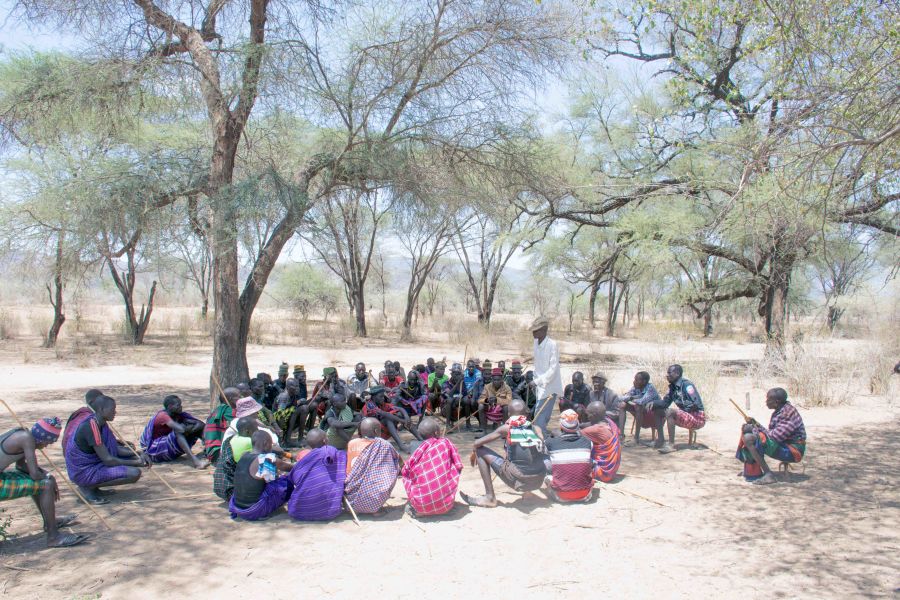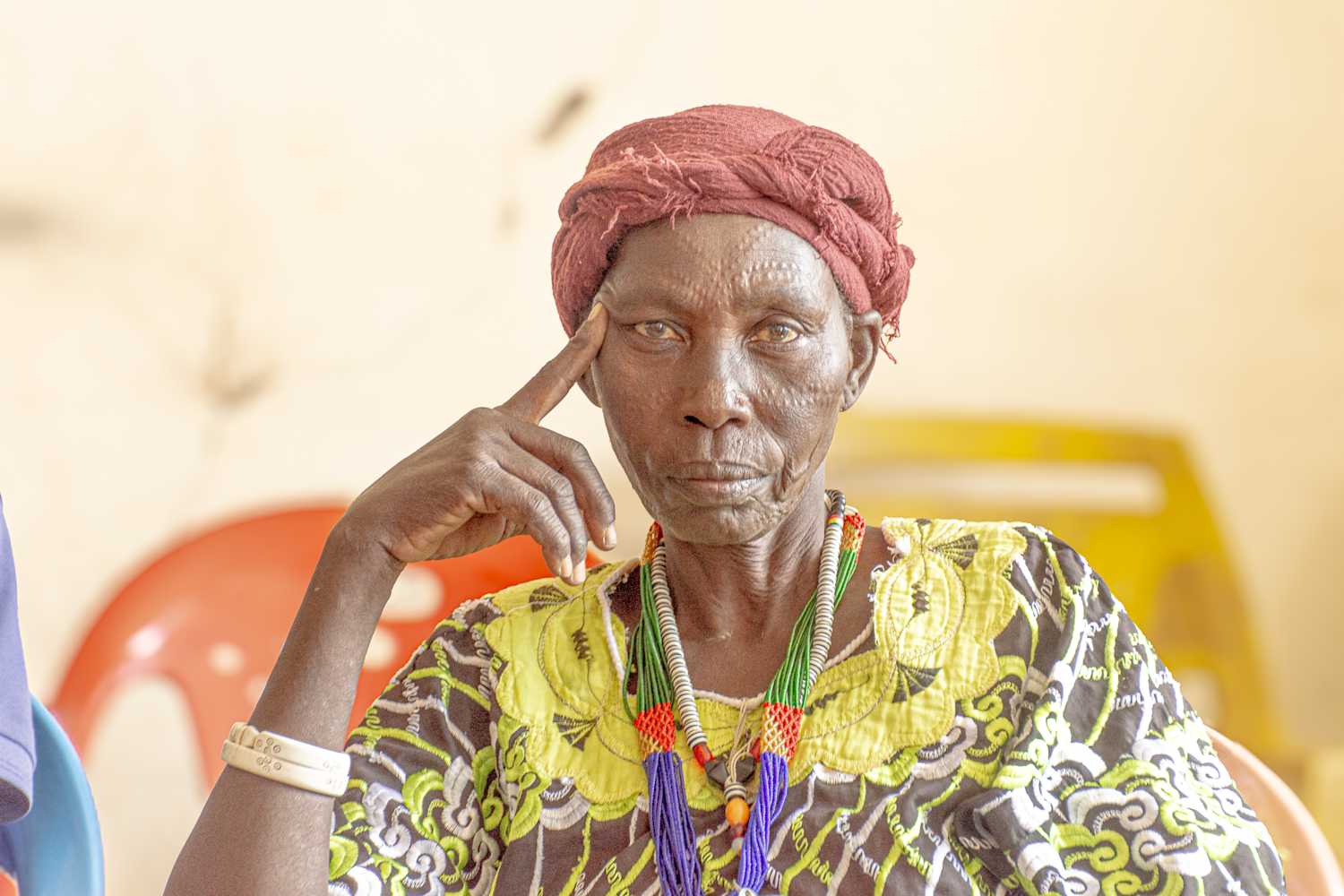
Navigating the Horn’s Borders: What do cross-border traders, farmers and pastoralists from the Horn of Africa have in common?
Peace!
Imagine a scene beneath a sprawling acacia tree in a remote village called Loya in Kenya, sunlight dappling the ground where two dozen elders and young people gather. They hail from neighbouring communities – Turkana and Pokot – separated by a border but historically bound by numerous commonalities. In the past, whispers of stolen livestock might have sparked a violent clash. Today, however, these communities are united in a mission for peace, engaging in dialogue to settle the issue calmly.
Think of a region where cattle raids, once a frequent occurrence, have become a thing of the past. Picture communities coming together, not in conflict, but in collaboration to build a more peaceful and thriving future. This inspiring story is unfolding across the Karamoja cluster, thanks, in part, to the Life & Peace Institute’s (LPI) Cross-Border Cooperation Small Grants Initiative to foster local initiatives for peace and development and the unwavering spirit of its people.
The story begins with a challenge. Cattle raiding, a deeply rooted practice fueled by complex historical and social factors, has plagued the region, disrupting lives and hindering development. James Lopai, a clan leader, trader and agro-pastoralist in the Eastern Equatoria State of South Sudan, poignantly reflects on this problem, stating, "animal keeping, once a vital part of our lives, is constantly challenged by animal raids from other groups," highlighting the negative impact of cattle raids on livelihoods and the constant threat of violence. His sentiment is shared bycommunities straddling the borderlands in the Horn of Africa.
Recognising this security challenge, a group of local civil society organisations (CSOs) decided to join forces in five clusters spanning across the Karamoja region. Operating in the borderlands of Ethiopia, Kenya, South Sudan, and Uganda, each of the five clusters received each a small grant support of USD 15,000. The clusters are proving to be a powerful alliance to tackle this challenge head-on. The clusters have facilitated the establishment of local peace initiatives and platforms and supported existing ones with training and equipment. The initiatives also play a key role in identifying and addressing causes of recurrent conflicts in the borderlands.
The cluster approach has been as unique as their partnership. The CSOs clusters didn't come in with a pre-packaged solution but instead listened to the needs of the communities. Working closely with the local administrations, they identified conflict hotspots and engaged with all key stakeholders on all sides of the borders to understand the root causes. This collaborative spirit laid the foundation for trust and a shared vision for peace.
PatricK Muangi, Administrator of Kibish Sub-County in Kenya, recently noted the enhanced cooperation between his administration and his counterpart in Nyangatom Woreda in Ethiopia, to manage common cross-border peace and security matters between their neighbouring communities. He underscored that the support from the Small Grants initiative has been instrumental in maintaining regular communication with their Ethiopian counterparts.
At the heart of the initiative has been the focus of empowering local communities. Instead of dictating solutions, the clusters have facilitated a bottom-up approach. Communities have played a crucial role in identifying members for the peace committees, ensuring these groups reflected the diverse voices and perspectives within the community. Notably, the committees included women and individuals with disabilities, fostering a sense of inclusivity and ensuring everyone had a stake in the peacebuilding process.
“Women are the primary victims of these conflicts, and naturally, we plead with the men to resolve conflicts peacefully. Women are peacemakers, regardless of which community they belong to,” Lucia Lokitoi, farmer and a member of one of the peace committees in South Sudan, said to emphasise the importance of including women in the peace committees.She notes the effectiveness of the newly formed peace committees, explaining, "Similar committees had existed before, but none were as effective as this one. The community picked members and leaders, fostering a sense of ownership and accountability." This bottom-up approach empowers local communities to identify and address their unique needs.
The focus on local ownership has proven to be a game-changer. The peace committees, equipped with training in peacebuilding and conflict resolution, have become instrumental in addressing local concerns and promoting social cohesion. Their efforts have yielded remarkable results. Once a constant threat, cattle raids and abductions of herders significantly decreased. The communities themselves noticed the positive change, viewing the clusters’ interventions not as outside interference but as genuine peace efforts from trusted partners facilitating local solutions.
Abraham Logir Lotecle from Innovative Development Initiative, one of the members of the South Sudan cluster, attests to the positive impact the peace committees have brought: “We haven’t had any major cattle raids in the area since the inception of the peace committees and their training in peacebuilding. The members are appreciative of receiving the training. The training created a deeper understanding for the greater need of social cohesion in their communities. Being part of the committees has also created a platform to share their minds with communities in the area.”
The Small Grants Initiative has continued to advance peacebuilding efforts in de-escalating tensions among the youth and engaging in cross-border dialogues with communities across the region, highlighting a commitment and readiness from communities in the region to prevent conflict and foster regional cooperation.
This shift in perception highlights another crucial aspect of the initiative's success: building trust and fostering meaningful partnerships. The clusters’ commitment to collaboration, transparency, and utilising local expertise resonated with the communities. This trust became the bedrock upon which a sustainable approach to peacebuilding could be built.
Elino Loracha, a farmer and a peace committee member, expresses his hope for the future, stating, "with constant dialogues, we no longer see the abduction of cattle herders in the region." This highlights the tangible progress starting to be made in reducing violence since the small grants facilitated the setting up of the peace committees. Lucia Lokitoi embodies this hope, stating, "I'm hopeful, with the training I received, that I'll be able to influence the youth and the future of the community will be peaceful and vibrant."

Moving ahead, Elizabeth Itabu, a peace committee member and deputy chairwoman of a county women’s association in South Sudan calls for more training on peacebuilding and community dialogues, emphasising the importance of communication and collaboration in sustaining peace. This message serves as a reminder that building lasting peace requires ongoing commitment and collective action.
The Horn of Africa is brimming with potential for peaceful co-existence. This was recently exemplified at a gathering in Kangaten town, Ethiopia, where a vibrant Community Peace Actors Meeting brought together local authorities, elders, youth, women, farmers, cross-border traders, and pastoralists from both sides of the Kenya-Ethiopia border – including Nyangatom and Turkana communities. This wasn't just a symbolic gesture but a testament to the progress made through initiatives like the Small Grants programme. As partiicipants shared experiences and strategised for a more secure future, the spirit of collaboration in Kangaten and Loya offered a glimpse into a future where shared solutions would replace conflict across the entire Karamoja Cluster.
So, what do cross-border traders, farmers, and pastoralists from the Horn of Africa have in common? Peace! It's not just a dream, but a future actively pursued by these communities united in their desire for a more prosperous and secure tomorrow.
Most recent blog posts
2026-01-13
Placing Local Voices at the Centre of Regional Peacekeeping ConversationsA Reflection from the Horn Dialogue Series IV